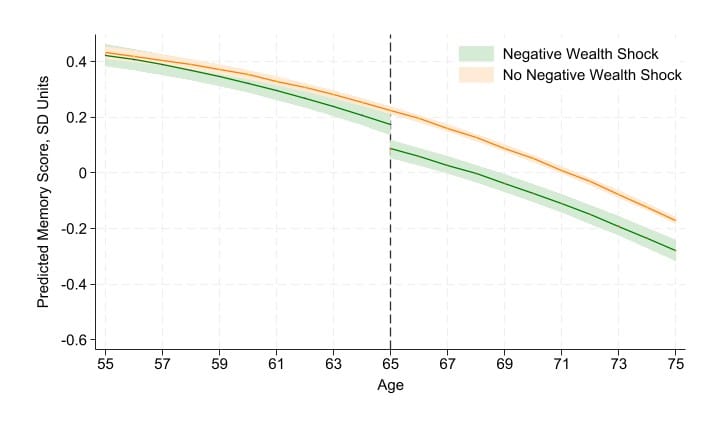Aging
Memory Trajectories Before and After a Negative Wealth Shock, the United States Health and Retirement Study, 1998-2020 Tsai-Chin Cho* Tsai-Chin Cho Ashly C. Westrick Sara D. Adar HwaJung Choi Kenneth M. Langa Lindsay C. Kobayashi
Background: Negative wealth shocks are sudden wealth losses that may contribute to worse cognitive health and may result from advanced financial planning after the onset of dementia symptoms. To investigate the bidirectional relationships between negative wealth shocks and cognitive aging outcomes, we examined the acute change in memory function immediately after a negative wealth shock (vs. no shock) in mid-to-later life, as well as the long-term memory aging before and after a negative wealth shock in comparison to memory aging in the absence of the shock.
Methods: The sample population included participants aged ≥55 from the US Health and Retirement Study survey in 1998 (baseline) and all their follow-up interviews until 2018. The study outcome was an imputed composite memory function z-score (in SD units), which captured both self and proxy memory assessments. A negative wealth shock was defined as a loss of ≥75% in equivalized household total net worth between biennial survey interviews. We employed multivariable-adjusted mixed-effect linear models with segmented time effects to examine differences in memory aging slopes before and after a negative wealth shock.
Results: There are 3,197 participants (26,233 participant-year observations) with the experience of a negative wealth shock and 8,932 participants (66,956 observations) without. An acute drop of 0.17 SD units (95% CI: -0.19, -0.15) in memory function immediately following a negative wealth shock. Comparing those who did vs. did not experience a negative wealth shock, the difference in the memory aging slope before a negative wealth shock was nearly null, while the memory aging slope was 0.13 SD units (95% CI: -0.17, -0.09) steeper per decade after the shock. Figure 1 visualizes the predicted slopes of memory decline according to the experience of a negative wealth shock.
Discussion: This study provides evidence of the detrimental cognitive health effects of negative wealth shocks in later adulthood, which may inform the design of interventions and means of supporting healthy cognitive aging.

